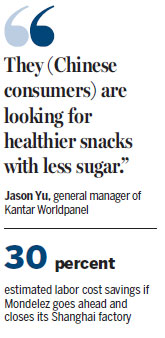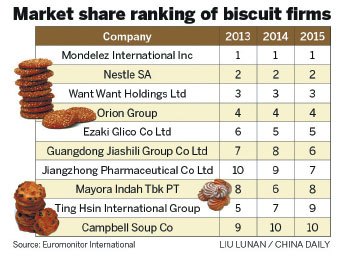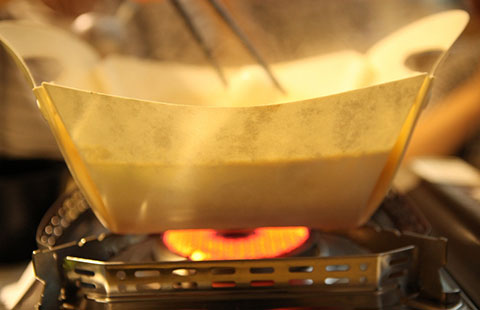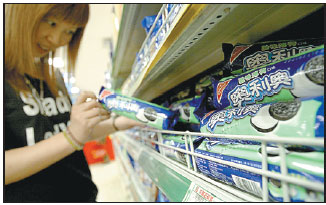Mondelez slims down after biscuit sector crumbles
Updated: 2015-09-02 08:38
By Wang Zhuoqiong(China Daily USA)
|
|||||||||
Global snack leader Mondelez International Inc is sliming down its corporate operation in China to cope with failing revenue and rising costs.
The maker of leading biscuit brands, such as Oreo and Chips Ahoy, plans to close down its Shanghai factory and switch production to Suzhou in Jiangsu province of East China.
At one point, the Shanghai operation had four production lines with 400 employees.
Moves like this will save Mondelez 30 percent in labor costs, according to Zhu Danpeng, a food industry researcher with 21food.cn, an online blog focusing on the food industry.
"To further optimize our supply chain, Mondelez China has decided to shift certain production from our Shanghai facility to other manufacturing plants," Mondelez China said in a statement without disclosing exact figures of the cost-saving plan.
"We are in regular dialogues with employees who are affected by the change to ensure (they) are treated with respect and are provided settlement plans according to Chinese law and regulation."
Mondelez has considered it necessary to "adjust" its "sales model", so the company can "reinvest in brands" that appeal to consumers and fend off rivals in a highly competitive marketplace.
"Biscuits have become a secondary option in snack consumption," Zhu said, adding that consumer tastes have changed.

Costumers are now looking for more healthy options. Data from Kantar Worldpanel, the global consumer research company, showed that yogurts continued to post strong growth in China, while chocolates and biscuits dipped.
Biscuits sales growth dropped from 9.9 percent in 2013 to 8.4 percent last year. While the growth in cheese snacks climbed from 17.7 percent to 23.9 percent during the same period, according to Kantar.
Figures from Euromonitor International, the worldwide market intelligence firm in the United Kingdom, showed that Mondelez's share in the biscuit sector in China fell from 13.4 percent in 2013 to 10.3 percent this year. Market share of Mondelez has been declining due to weak performance of its main brand Oreo, Euromonitor pointed out.
"Mondelez is coping with changing aspirations of Chinese consumers. They are looking for healthier snacks with less sugar," Jason Yu, general manager of Kantar Worldpanel, said. "At the same time, Mondelez is also competing against local brands."
Last year, mushroom biscuits rolled out by a Chinese pharmaceutical company, Jiangzhong Group Co Ltd, caught them off guard, and the brand is still selling well.
"More local products are lining up to attack multinational consumer labels while focusing on a niche sector that is ignored by major market leaders", Yu said.
In an interview with China Daily earlier this year, Stephen Maher, president of Mondelez China, pointed out that one yuan in every four is spent on one of the company's brands in the biscuit sector.
Still, Mondelez China is confident that chewing gum will be a major revenue driver in the years ahead after introducing the new Trident label, which is aimed at middle-class family consumers.
Last year, the chewing gum market in China, the second-largest behind the United States, was worth 18.85 billion yuan ($3.03 billion), a research report released by Mintel Group Ltd, a market intelligence agency in the United Kingdom, highlighted.
Along with its 5.5 percent market share taken by Stride, Mondelez is expected to close the gap on dominant players such as Extra and Double Mint, owned by Confectionary China Ltd, part of Mars Inc.
wangzhuoqiong@chinadaily.com.cn

|
Oreo cookies on a supermarket shelf in Shanghai.Provided To China Daily |
(China Daily USA 09/02/2015 page15)

 Red carpet ceremony for first grade kids
Red carpet ceremony for first grade kids
 Kashgar old city in Xinjiang is well preserved
Kashgar old city in Xinjiang is well preserved
 Infographic: Symbols behind numbers
Infographic: Symbols behind numbers
 Beijing's preparations begin long before the parade starts
Beijing's preparations begin long before the parade starts
 Female soldiers of military band practice for the V-Day parade
Female soldiers of military band practice for the V-Day parade
 Robotic exhibition set to kick off in Shenyang
Robotic exhibition set to kick off in Shenyang
 Eat from a paper hotpot
Eat from a paper hotpot
 8 interesting facts about the upcoming V-day Parade
8 interesting facts about the upcoming V-day Parade
Most Viewed
Editor's Picks

|

|

|

|

|

|
Today's Top News
Xi awards medals to veterans
China and US working closely on every major issue: Envoy
$16b added by 50 brokerages to support shaky market
PLA to showcase top weapons for the first time in parade
Senior US official to visit China on bilateral issues
China manufacturing PMI falls to 49.7 in August
Second homes in China need lower down payment
Xi meets with former KMT chairman
US Weekly

|

|









